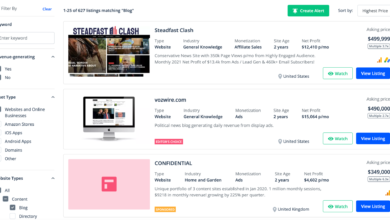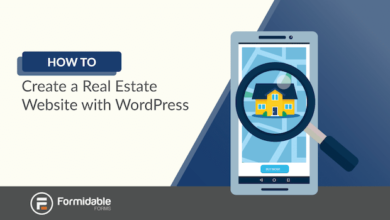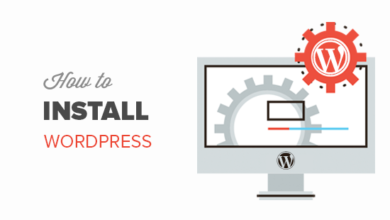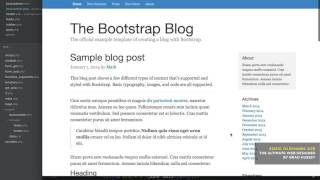How to Create a Freelance Writer Website That Actually Gets You Writing Gigs

The reality is freelancing. Did you know? During the COVID-19 pandemic, more than a third of America’s workforce contributed $1.2 trillion to the economy through freelance work — a 22% increase since 2019. Also, by 2027, freelancers are projected to make up the majority, with more than 86 million people still self-employed in the United States.
So whether you work exclusively as a freelancer or take on additional side projects alongside your full-time job, you will join an ever-growing group of successful, independent and creative tradespeople who are looking for flexible alternatives to traditional employment.
Reading: How to create a website for freelance writing and editing
In addition, the innovation and growth of technology has made the work environment for freelancers more fruitful: 42% of freelancers found work on social media. In this unpredictable nature of the economy during pandemic times, freelance work becomes even more valuable.
And you freelance writers, bloggers and web content creators – see you. We know you are out there coloring the world with your beautiful language and lightbulb ideas. They’re needed now more than ever!
But since freelancers must do their own marketing, you must use every tool available to build a productive writing business. One of the greatest weapons in your arsenal? A relevant web presence. Forget searching through job ads to find work – building an online presence and presenting a powerful virtual resume are essential to being seen and making money.
How to differentiate yourself from your show your best side? A top notch site. For writers, a killer freelance writing website is a make-it-or-break-it tool to get leads for quality writing jobs. And we’ll show you how.
A website allows you to showcase your talent and personality, generate lasting sales, build your author portfolio, and connect with potential and returning clients to build your business and financial success—all in one Location.
Why is it important to have a good freelance writing website?
So, wait. To back up. You’re a writer – you know, good old pen and paper. Why do you even need a website? With a well-designed freelance writing website, you can:
- Showcase your online portfolio. One of the most significant benefits of creating a freelance writing website is a living, breathing portfolio that is easily accessible online. Potential clients can access your work and get a feel for your style, voice and writing skills through a wide range of content. In addition, they can see your past work and a wealth of relevant content that will help them entrust their business to you.
- Increase brand visibility. Your website is a visible showcase of your writing skills and a crucial tool in creating brand awareness. With a powerful online presence, visitors don’t have to dig around to find information about your offerings. Not only do you make it possible for people to find you online, but your website also helps you build liking. With great content and engaging content, visitors will begin to take an interest in you and your work and will entertain the prospect of working with you. It demonstrates your legitimacy as a writing professional and helps position you as an authority in your field. By making your work accessible, you expand your visibility and provide social proof, which in turn increases your chances of finding rewarding freelance writing. Given the competitive nature of freelance work in COVID times, you need a head start.
- Boost brand legitimacy. let’s be real Businesses without a website or internet presence tend to raise some red flags in the ecommerce ecosystem, right? Everything is on the web. Nowadays, a dot-com is an essential requirement in the business world. When internet users can’t find your virtual corner of the web, customers looking for a specific product or service will immediately think, “If they’re not online in a fully digital age, can we trust this company?”
If you want to do business in the world we live in and market a product or service, it goes without saying that potential customers need to be able to find you with just a few clicks from your browser. So, on a very basic level, having a website helps establish your brand as a legitimate business, rather than just running amateurs or letting customers rely on what they get from your social media presence. The better you build your site with great content and strong graphics, the more that legitimacy will increase and work in your favor. Therefore, in order to improve your bottom line and gain the trust of web visitors, it is crucial to demonstrate not only your tech-savvy web skills, but also your ability to build a professional and valuable web presence.
Still in doubt? We understand. Let’s clear up any possible concerns.
We know you’re wondering: do I need to have a freelance writing website when I’m just starting out? The short answer: no. BUT – an established website for your freelance writing (your services and a presentation portfolio) is the best way to build a marketing funnel and establish a legitimate, cohesive and authoritative brand. It’s a clear way to put yourself at your best and secure quality writing jobs.
Okay, but wait. It’s 2022 you say. Can’t I just use social media like a LinkedIn company page instead of a website to promote my writing business? Secure. But a website, even a simple one, is a good idea. With a well-established freelance writing website, you build authority as a brand and increase your chances of being seen by potential clients. They can easily contact you. Plus, you own all the content on your site – something that’s not always true on social media sites.
Perhaps building a powerful and snazzy-looking freelance writing website seems like an overwhelming task. But making the effort to set up a website is an investment with a guaranteed return. A site to admire – and one that will hire you.
Related: Want to make a website this year? Here’s your game plan
7 Steps to Build a Great Freelance Writing Website
As I said, creating a great-looking freelance writing website is enough not off It doesn’t have to be rocket science or overly time consuming. We’ll show you how to set up a website in seven easy-to-use steps.
1. Brand Your Business
Time to pick a name, business owners! When branding yourself and marketing your skills, you can use your own name, but before deciding on a nickname, ask yourself some of the following general questions: Would you ever sell your business? Even if you’re not entirely sure of your long-term business plan, you probably have an idea if you ever intend to share your writing business or incorporate the services or products of others in connection with your business. If you have the idea of someday selling your brand or entering into a partnership, don’t brand yourself with your own name. Obviously this is unique to you and will not be carried over. Additionally, if your name is difficult to spell, pronounce or remember, consider that the possible confusion of using your name could cost your business.
On the other hand, your personal name can help make you unique as a brand, as potential customers can distinguish you from other businesses that write common names. So think about your options before you haphazardly throw yourself into a brand or company name. You never know how you’ll grow, adapt, and change in your freelance writing business. So, you should choose carefully to set yourself up for long-term success.
2. Choose a content management system
Now that you’ve got your brand’s fancy new nameplate, you need a content management system (CMS) to handle the creation and publishing of your content on the Internet to facilitate . The best part? You don’t need to know how to program a single line of code to use one! Take WordPress, one of the most popular content management systems on the web (it powers over 43% of the web!)
Related: What is WordPress? Everything You Need to Know About the Platform
The WordPress platform allows you to create and manage your web content without the pressure of a deep learning curve – you can set up a website with little to no technical knowledge.
3. Register a domain and set up hosting
See also: How To Delete an Event on Facebook?
OK, you’ve decided to use WordPress and you’re full of great content ideas. Good to go, right? Well, first you need to give your website a home on the web so that visitors can actually see and interact with your content. All these great ideas will come to nothing if your website is not available online. That means you need two very important components: a domain name and a hosting provider. A domain is the unique web address at which your website can be found. This is what visitors type into their browser to navigate to your website (e.g. www.dreamhost.com). Your domain is unique to your website and should match your brand or business name. You should also consider your choice of top-level domain—that is, .com or .blog or dot-whatever—to position yourself as an authority in search engine rankings. Whatever domain name you choose, you buy it through a registrar. Next you need a hosting provider. Hosting companies will sell you unique plans that include space on a server so your website can live online. Without a server, your website cannot be visited. To have the best chance of quality gigs, you need a quality hosting provider.
There are many providers out there, but only DreamHost can offer you the best of the best: unique features, powerful technology, and responsive support. We also make things easy: domain registration and hosting services under one roof and one-click WordPress installations. For shared hosting, simply check the “Preinstall WordPress” box during sign up and Boom! We install it for you.
Shared hosting gives serious WordPress beginners everything they need to build a killer website for the freelance writers to hire. Even better? Our shared hosting plans start at just $1.99 per month.

4. Choose a WordPress Theme
Time to customize your website with a WordPress theme. The theme you choose not only determines the overall look and feel of your site (although it does), but also determines what type of functionality your site will have. With the right theme, you can control and tailor your website to your exact specifications and niches. Browse the WordPress theme directory or search for WordPress theme developers to find and install your perfect theme.

5. Decide what content your website needs
So what does your website need as a freelance writer? What are the must-have content and features relevant to your niche? time to make a plan. While you have the freedom to customize your website to fit your brand and personality, there are some essential pages your website should have for the best possible business success:
- Home Page: An easy-to-navigate and attractive landing page that can direct visitors and potential customers to important parts of your website.
- Online Portfolio: Your website should be a solid, structured way to present your Demonstrate skills as a professional writer. An important feature – no, an advantage – of your website is an easy-to-find, dedicated portfolio section where you can showcase relevant published work and showcase your writing skills.
- Services : Website visitors need to be aware of the products or services your business offers. Provide potential clients with a clear and detailed description of the specific writing services you specialize in.
- About Us: Don’t be a robot behind the computer screen. Show off your writing skills, let potential clients and visitors get to know you, and help them become familiar with your unique voice by using an engaging and humanizing meet and greet section. Show your achievements and passion for what you do, but also share what makes you unique.
- Contact: How can potential customers get in touch with you? Make your contact information easy to find and use.
Now that you’ve got your essential pages set up, it’s time to take your freelance writing site to the next bring level. While you should avoid the non-essentials, consider adding the following optional (but helpful) pages:
- Customers: Name-dropping your current customers on your site is one great way to demonstrate social proof and establish your authority in the field. Think of it as virtual word of mouth.
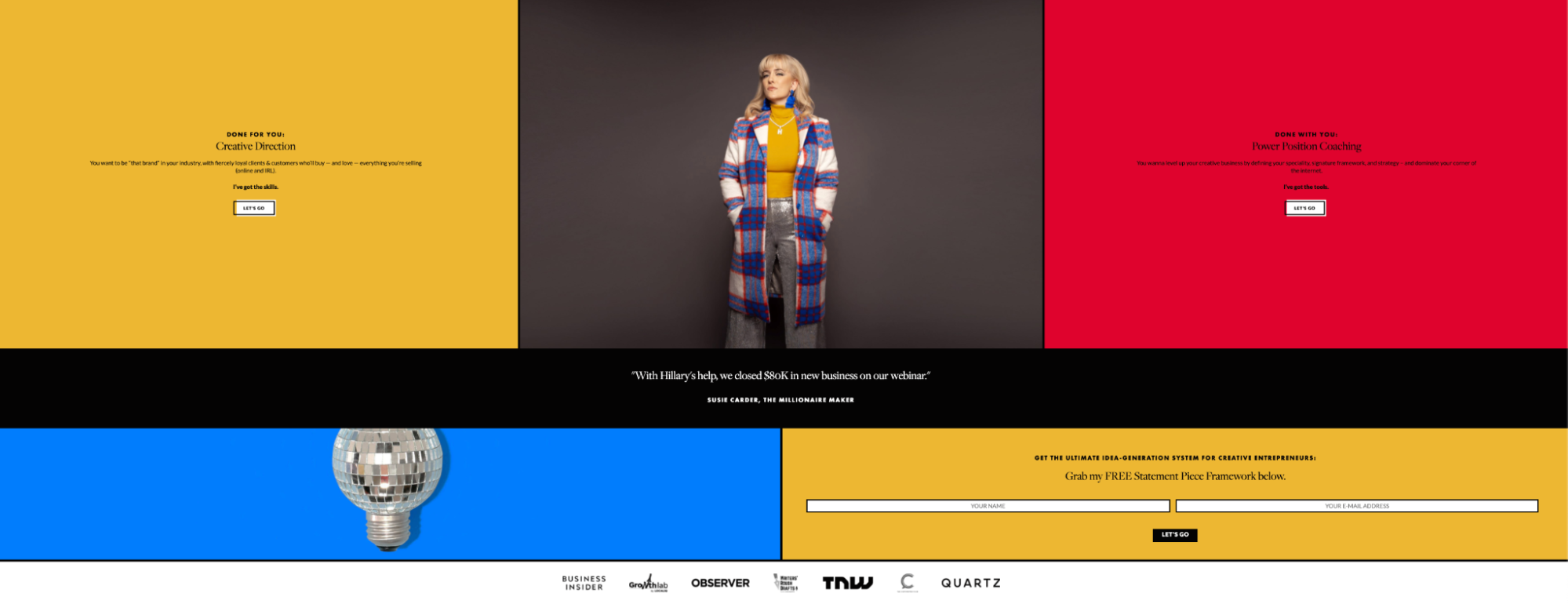
- Testimonials : The power of a good review cannot be overstated, especially in an online environment. Confidently presenting positive feedback you’ve received from clients in your field about your writing services can be great fodder for attracting new clients and more writing jobs. It’s okay to blow your own horn.

- Blog: In addition to your portfolio, you can showcase your writing skills and unique voice with a content-rich blog. The extra effort and value you provide your visitors with relevant blog content can be a high-return investment.
- CV: Allow visitors and prospects to create a Bulleted list of your skills and achievements with an easy-to-view resume.
- FAQs: When you may be able to answer frequently asked questions about your work or services, or provide potential clients with more specific information about them want to share what you offer, consider adding an FAQ section.
- Downloads/Freebies: When you make free downloadable goodies available to your visitors on your website, you show that you are committed to providing value and demonstrate the high level of Quality of your freelance business.
Finally, consider pricing: if you want your website to make the cost of your services clear, be transparent, direct, and trust the value of your work. Or, if you have customization service options, you can keep costs in check and invite interested visitors to contact you for a quote.
6. Create the content
Time to create! You know the saying: content is king. Live by it. You need to fill your website with rich content to attract visitors and prove your worthiness as a business. Fill the content on your must-have pages first, and then provide valuable content regularly. Just as important as creating content is creating it intelligently — that is, using it to get found by potential customers. How does it work? Using Keywords. Think about it: What are relevant topics and search terms related to your field? If you use clever wording and common search terms in your content, you can position yourself for good rankings and stronger search engine optimization. So do your research and incorporate common search terms into your content. Use tools like Google’s comprehensive (and free!) Keyword Planner to create high-traffic website content with intelligent keyword research and build a strong content marketing strategy. Also consider the tone of your content. Does it represent your brand appropriately and uniquely? Does it represent your expertise and/or personality? One of the most marketable tools in your writing repertoire is your voice – use it wisely. Show what prospects can achieve with your unique skills by using your tone consciously and intentionally.
7. Home
Celebrate! Toast yourself, dance a little, pat yourself on the back. You managed! Your website is online! you should be proud We know that having something live on the internet can be nerve-wracking. Don’t worry that your website isn’t perfect. The main thing is that it is there.
Remember that you can always perfect and tweak over time. Most importantly, people can start finding you – and you have something to improve.
Seven mistakes to avoid when setting up your author website
When you start your website, it is inevitable that you will face a learning curve . Some things just take time to learn. You will improve over time. But guess what? We want you to be successful – as quickly as possible. So we’re giving you some insider knowledge: a list of do’s and don’ts when setting up your freelance writing site. Avoid those big whoops, and you’ll be one step ahead when it comes to attracting quality writing jobs.
1. Poor graphics
Let’s talk a little bit about science. A large part of our brain is dedicated to processing visual content. 80% of people remember what they see (compared to 10% of what they hear and 20% of what they read.) Finally, know that visuals help drive traffic – Content creators who offer visual content drive traffic 12x faster than those who don’t. Not having visuals as part of your freelance writing site is a BIG no-no. But beyond that, poor looks can kill your chance of building a successful freelance writing business. A company’s credibility assessment is 75% based on the company’s website design. So take the first impression you make with your pictures seriously. Your images should reflect the quality work you offer and prove to potential clients and their money that you can be trusted. To capitalize on the traffic-building and engaging powers of excellent visuals, choose quality images and robust visual structure, and remember: white space is good space.
2. CTA Issues
When visitors come to your site, you want them to do something. But if you don’t request them, they’ll click away and you won’t get a deal. Not ideal. Even if you have great writing skills and website design, confusing, conflicting, or non-existent CTAs (70% of small business websites don’t have a CTA) will hurt your chances of growing your business.
So think: what do visitors have to do in order to place orders for your company? Whether you’re subscribing to an email list, filling out a contact form, or displaying your work portfolio, make sure your CTA is visible, clear, and focused.

3. Sloppy formatting
You’re not just a freelancer – you’re a brand.Therefore, your potential customers expect a certain level of professionalism from you, so they need to see that the moment they click on your website. Along with clear navigation, a focused visual structure, and a smooth contact funnel, your website needs to be fine-tuned, elegant, and polished.
Even as a freelancer, as an entrepreneurial free spirit, you need to channel that suit-and-tie vibe on your website to gain the trust of potential clients. No sloppy formatting, buggy text, or overly casual design. Deal with the details. If you want people to trust you with their money, you have to be professional. Meticulous formatting not only helps your website design make a great first impression (remember those insightful graphics stats?), but it also helps people see you as a trustworthy company.
Related: How to Create a Brand Style Guide for Your Website
4. TMI (Too Much Information)
Don’t get us wrong; It’s great to be personable and relatable. A crucial part of your brand’s success is your likeability. You want to be a person to visitors and potential customers, not just a robot writer behind a screen.
But your website is not your online diary.
See also: How Much Does it Cost to Build a Website in 2023?
Do not share too much personal information or content that is irrelevant to your area of expertise. Instead, focus on your content and strategize about what to share, all with the goal of building your business and attracting customers.
5. No Target Audience
You have a brand new freelance writing website and you’re ready to start generating traffic and ideally new business. But who do you want to reach with your website? What kind of people do you want to address? Put simply, who is your target audience?
Your success will be largely determined by how you focus your efforts on building a business. If you cast too wide a net, you won’t be able to effectively target the high-value customers you want. So before you start building traffic, identify your target.
6. Weak copy
You are a writer. Skilled wordsmithing is your talent, your money-making tool, and your passion. That being said, every aspect of your website should reflect your writing skills. Weak, lackluster copy will not bring you customers, build trust, or engage visitors. In fact, it will send potential customers to your competitors.
Take extra care to ensure that your copy is strong, attractive, and polished. Whether you’re writing blog posts, articles, or landing page copy, don’t just let it — write and rewrite, find a second pair of eyes for outside observation, and edit, edit, edit. The strength of your copy will make or break your business.
7. Infrequent Updates
Reality check: Building a money-making freelance writing website is not a one-time thing. Just like software needs to be updated regularly, so does your website. Regular updates not only help you in terms of SEO but also keep things relevant and professional. Update blog content, test plugins, collect feedback and often use site analytics to adjust how it works for maximum UX. Be aware that you won’t always get it right the first time – constantly try to improve all aspects of your site.
Related: The Complete Guide to Cleaning Your WordPress Site
Handy Resources for Starting a Writing Website
Don’t worry – we’re not just throwing you to the wolves of the web without a few other top-notch tools for your burgeoning freelance website authors. Here we offer you a well-curated summary, a well-stocked toolbox of handy virtual resources designed to help you achieve your goals.
Web Hosting
We know we mentioned this before, but a good web hosting provider can make all the difference in the success of your freelance writing business. This is true. A reliable hosting provider can not only simplify content creation, but also make managing your website a breeze, allowing you to focus on the most important aspects of your writing business.
With DreamHost shared hosting plans, we give you these benefits and more—including 24/7 support, high-performance technology, and budget-friendly options. Choosing a hosting provider is one of the first decisions you will make on your journey – make a wise choice with DreamHost.
Logo
As we’ve said before, your freelance writing business is just that: a business. And most companies out there are easily identifiable by one unique feature – their logo. Think of a famous company: Nike, Apple, McDonald’s – you can quickly think of their logo just by seeing the name, right? Or could you easily spot it just by seeing the logo’s telltale image? Having your own logo is an essential part of building and building your brand. It is important for consistency, visibility and growth.But no worry; It’s not difficult to create one that your visitors will love.
Brand Colors
In addition to your logo, you should create a color palette that is unique to your brand. This helps your site and materials feel cohesive and professional, and can even help you grow your business by highlighting relevant sections or CTAs with specific colors. Choosing your branding colors is as easy as 1-2-3, but remember to be conscious about your personal branding choices.
Stock Images
We’ We’ve already emphasized the importance of visuals in generating traffic and engaging visitors. So where do you get professional-looking images and other visuals? Try Pexels or Unsplash for high-resolution, royalty-free photos, or find a photographer to take some for you. If you’re ambitious, follow a do-it-yourself home photography guide to inexpensively shoot yourself. And remember, copyright rules apply, so keep things legal. Give credit where it’s needed, and don’t steal.
Photo editing
You don’t need to be an Adobe Photoshop master to add that extra something to your images bestow phew. Crop, adjust and enhance your photos to improve composition and turn your website visuals into a powerful tool to earn your business. Try out a few simple photo editing tricks with your software of choice.
Icons
Another type of imagery, icons or symbols can be used on your website visitors makes it easy to find exactly what they’re looking for – whether it’s your social media pages, portfolio or contact form – without having to navigate menus or copy content. They are a universal language! Get great looking icons from sites like The Noun Project, Creative Market, or for free on Flat Icon.
Design
Your freelance writing site should be have their own unique feel. After all, you are your unique brand. Your design not only includes your layout, but also the style of your text, graphics and navigation. A well-designed website is carefully crafted for ultimate functionality and aesthetics, and we have the guide to help you make it look snazzy.
If you don’t have an eye for design, DreamHost can help. We have teamed up with the experts at RipeConcepts, a leading web design company, to offer professional web design services to our users.
The Final Word
Now we reveal the results of our crystal ball reading: We see a bright (and productive) freelance writing career in your future! Getting quality writing jobs might take some legwork when building websites, but with a well-built website, you’re well on your way to new clients and a growing portfolio.
Because your success is our success, DreamHost offers you the perfect entry-level hosting plans to get you up and running. Check out our comprehensive shared hosting plans to take your freelance writing website career to the next level.
See also: How To Trace Email Sender Location
.
